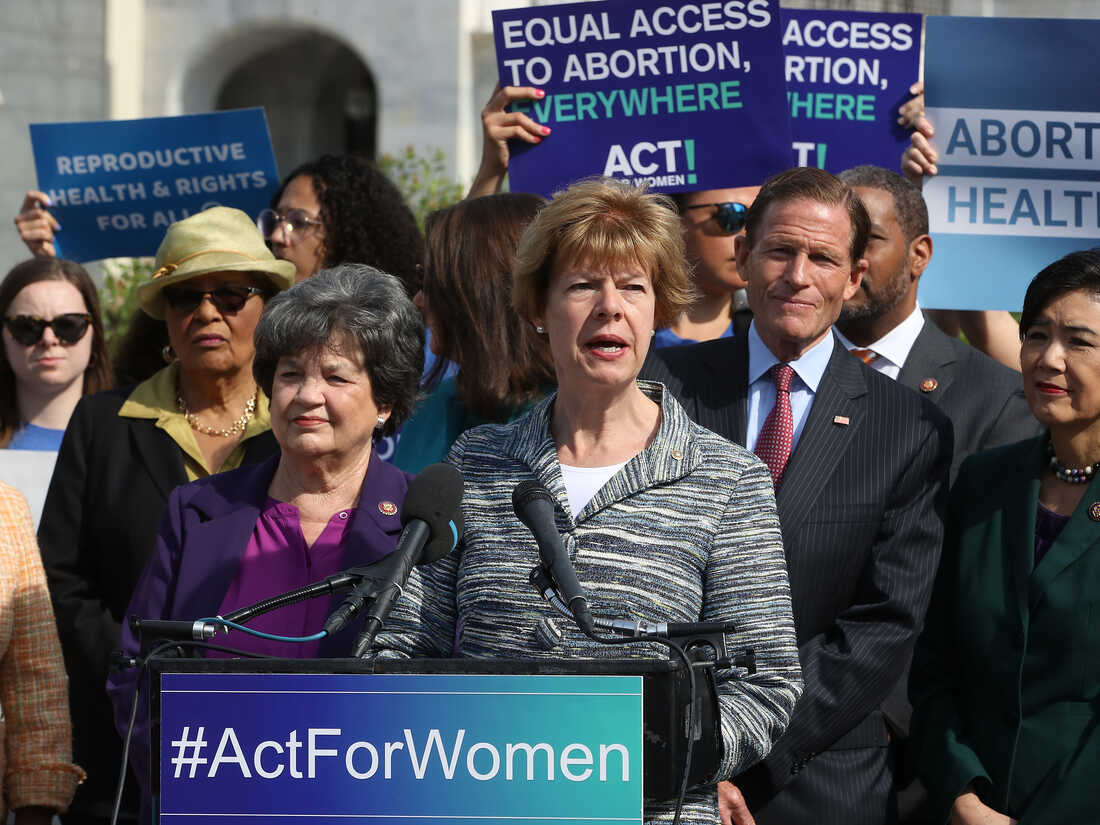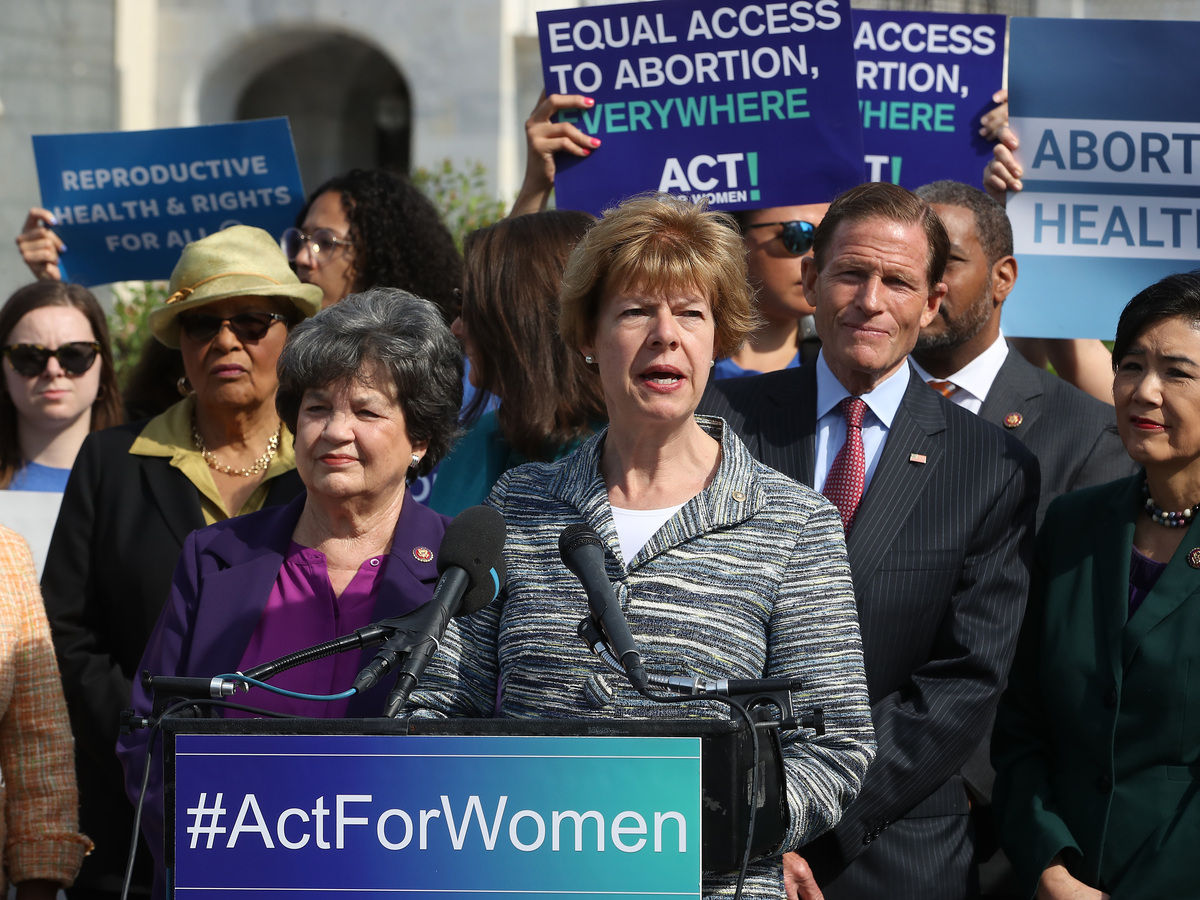
Democratic Sen. Tammy Baldwin in Washington, D.C., in 2019. Her state of Wisconsin now has close to complete ban on abortion beneath an 1849 legislation.
Mark Wilson/Getty Photographs
cover caption
toggle caption
Mark Wilson/Getty Photographs
Democratic Sen. Tammy Baldwin in Washington, D.C., in 2019. Her state of Wisconsin now has close to complete ban on abortion beneath an 1849 legislation.
Mark Wilson/Getty Photographs
Sami Stroebel, an aspiring obstetrician-gynecologist, began medical college on the College of Wisconsin in Madison final summer season inside weeks of the Supreme Court docket’s resolution to overturn the constitutional proper to an abortion.
“I sat there and was like, ‘How is that this going to vary the schooling that I’ll get and the way is that this going to vary my expertise wanting to offer this care to sufferers sooner or later?'”
Sen. Tammy Baldwin, the Democrat from Wisconsin, has a solution to that query.
Right now, she and Sen. Patty Murray (D-Wash.), the chair of the highly effective Senate appropriations committee, are introducing the Reproductive Well being Care Coaching Act. It establishes a grant program, to offer $25 million every year – for the following 5 years – to fund medical college students who depart their states to be taught abortion care, and applications that prepare them. It is particularly necessary in states like Wisconsin which have close to complete bans on abortion.
“College students and their supervising clinicians should journey out of state to get that element of their coaching,” Baldwin tells NPR. “In the meantime, neighboring states — and that is taking place throughout the US, are accepting an inflow of scholars.”
Stroebel, who co-leads her college’s chapter of the nationwide advocacy group Medical College students for Selection, needs to be taught to offer abortion care. The identical procedures and medicines used to offer abortion are additionally wanted when a being pregnant ends in miscarriage and in different ladies’s well being care that has nothing to do with being pregnant.
To be licensed, aspiring OB-GYNs should be taught to carry out the procedures and prescribe the medicines. However in Dobbs vs. Jackson Ladies’s Well being, the Supreme Court docket primarily made abortion rights a state-by-state problem.
“Wisconsin reverted to the 1849 legislation the place abortion is actually fully unlawful, besides in circumstances the place they are saying that the girl’s life is in imminent hazard,” Stroebel says.
Medical colleges in Wisconsin and the opposite states with close to complete bans cannot educate abortion care.
Baldwin says that, because the Dobbs resolution, there’s been a documented drop in OB-GYN medical residents who’re making use of to apply in Wisconsin and different states with bans.
“It’s exacerbating what was already a scarcity of suppliers within the state offering maternity care and most cancers screenings and different routine care,” Baldwin says.
Dr. Christina Francis, head of the American Affiliation of Professional-Life OB-GYNs, says medical coaching in being pregnant care does should be higher, however from her perspective, it ought to concentrate on routine look after points that make being pregnant difficult and unsafe equivalent to preeclampsia, diabetes and all the issues that result in the excessive price of cesarean sections within the U.S.
“We should be investing cash into taking higher care of girls throughout their pregnancies and after, and never investing cash in ending the lifetime of considered one of our sufferers and harming our different affected person within the course of,” Francis says.
Research present that the majority sufferers who’ve had abortions do not remorse getting one, and abortion procedures are far safer than being pregnant and childbirth itself.
Abortion care coaching has been an issue for years in states like Texas that started severely proscribing abortion lengthy earlier than the Dobbs ruling.

Given the brand new authorized panorama, Stroebel’s unsure how or the place she’ll apply sooner or later. For now, she needs to complete her medical schooling with the state college the place she’s enrolled, however she worries about her classmates and different college students in abortion-restricted states.
“It’s scary to assume that, you recognize, if plenty of OB-GYNs and up and coming medical college students need this coaching they usually cannot get it in locations like Wisconsin or Idaho or Alabama or Texas, you recognize what is going on to occur to the individuals who want that care in these states?”








